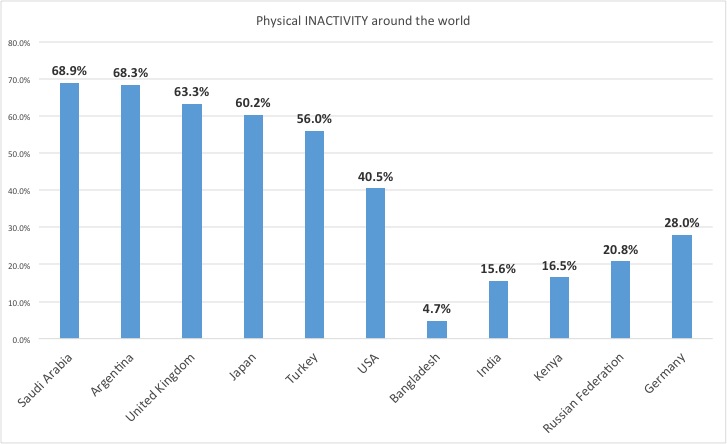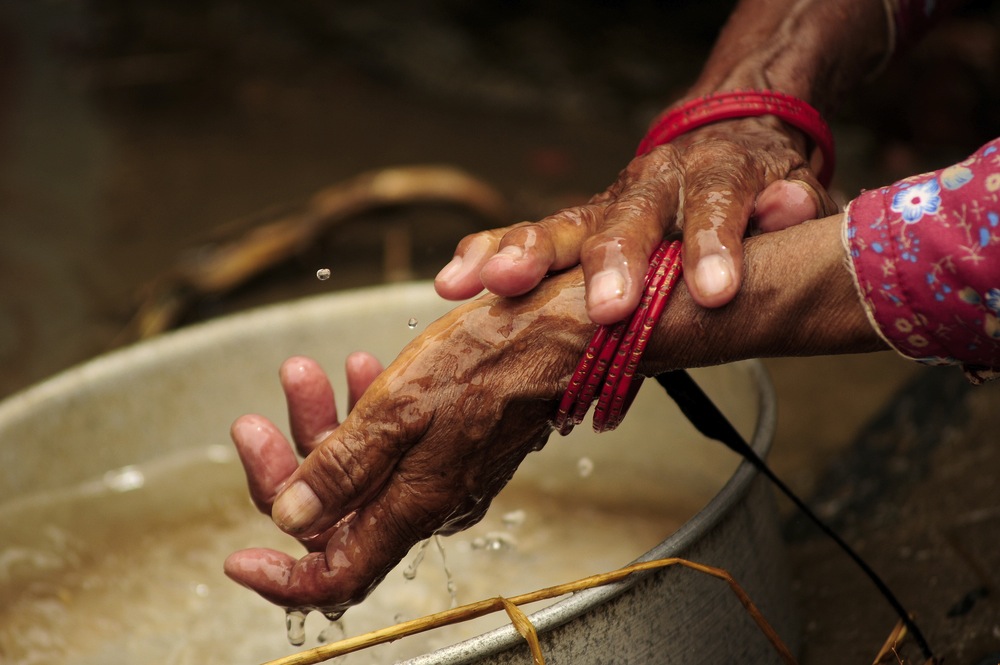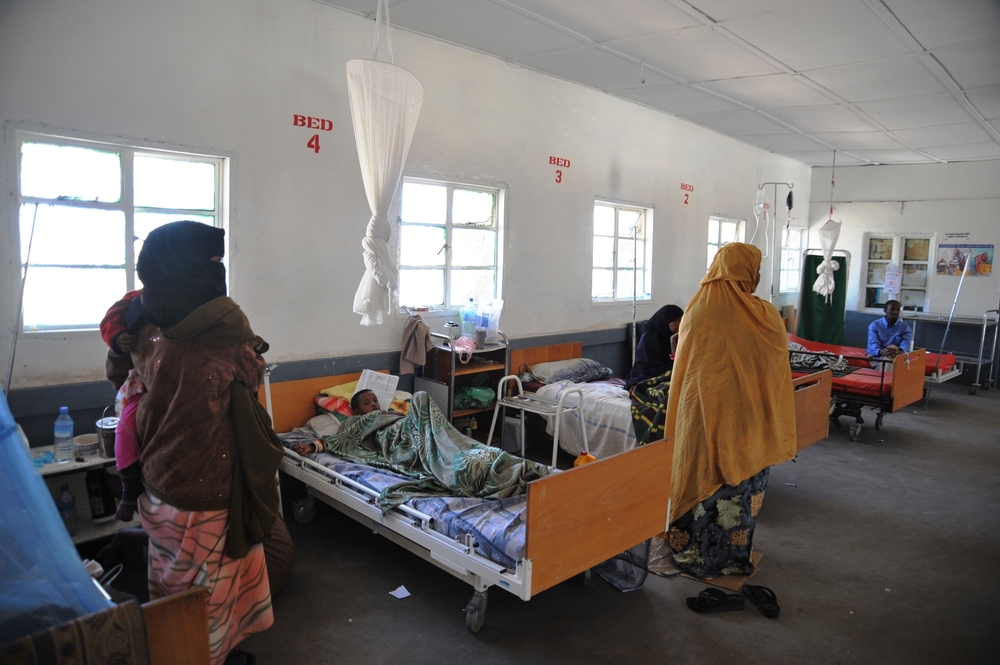In our second episode of this series, we dig a little deeper into the global health challenges that our world is facing today. Is Digital Health in its current shape and form up to the task? Global thinker Maneesh Juneja takes a look.
According to current estimates, there are 7.2 billion people on Earth in 193 countries. For many of us who read the headlines in Digital Health, it’s somewhat easy to assume that everyone’s needs are the same. For instance, much of the visible innovation seems to be in activity trackers, often applied to the wrist that can measure how many steps you take in a day. Wearing one of these devices would appear to be helpful to those of us who lead physically inactive lives, where our daily routine involves sitting—whether in a car, or in the office, or both. So, does the entire world need activity trackers? Let’s see what the research says on physical inactivity.
Research published in 2012 showed that physical inactivity levels among those aged 15 years or older does vary around the globe. The chart below shows just a few countries to highlight these differences. The results indicate to me that not everyone needs an activity tracker, especially those living in Bangladesh, India or Kenya.

What about health apps? If you live in a rich country and own a smartphone, it’s likely you have noticed the plethora of health apps. It’s estimated there are now over 100,000 health & fitness apps. In Latin America, the country with the highest smartphone penetration is Mexico, at 28%. Brazil, a country of almost 200 million, has smartphone penetration of just 23%. Africa currently has a smartphone penetration rate of just 12%. However, take Kenya, where smartphone penetration is 67%, on par with the USA. I wonder, over the next decade, where will some of the most innovative health apps be developed? Palo Alto in the USA or Nairobi in Kenya? However, even by 2017, it’s estimated that two thirds of the world will NOT be smartphone users. Are we building technology for those who need it most?
Globally, infectious diseases are the 2nd leading cause of deaths worldwide, after heart disease. This includes diseases such as lower respiratory infections, diarrheal diseases, HIV/AIDS, and tuberculosis. The most severely affected are the low income countries. What’s the most effective way of reducing the spread of infectious disease? Hand-washing, as it’s estimated that 80% of all infections are transmitted by hand. Even in the USA, 1 in 25 hospital patients pick up an infection during their care. About 11% of those patients die.

Technologies such as those from HanGenix sound very useful. If a caregiver enters a patient area in a hospital without having washed their hands, their tag will give off an audible alert. What low cost product could be invented that could be used to foster a culture of increased handwashing around the world? Not everyone owns a smartphone where they can download an app, so would it have to be a novel wrist-worn sensor of some kind?
What about the 1 billion people on Earth who don’t have access to a doctor, physical hospital, or clinic of any kind—what could Digital Health do for them? Well, some of the latest innovations developed in the West may actually be useful for them. Babylon is a new app from the UK which aims to be a “doctor in your pocket.” It’s an app where aspects of healthcare can be delivered virtually, such as consultations with a GP. It’s been mentioned that Babylon is looking to launch in Rwanda one day.
Then we have the X-Prize Tricorder challenge, a $10 million competition to bring healthcare to the palm of your hand. One of the teams competing is Scanadu, which in 2013 became the most funded campaign on the crowdfunding website, Indiegogo. The advancing trends in technology which promise a new era of healthcare delivered via our smartphones could ultimately benefit people around the world, as long as the cost of the devices becomes affordable over time.
Apple and Samsung have both recently announced platforms aimed to make it easier for consumers to collect data on their health from wearable technologies. Given that Apple and Samsung are two of the leading consumer electronics brands with a global presence, could these two organisations become the face of Digital Health—whether you live in Abu Dhabi, Accra or Athens?
We often hear about the role of social media and the Internet in Digital Health, with usage of tools such as Google, Facebook and Twitter frequently cited as examples of how patients and doctors can often learn and share lessons with each other. However, usage of social media tools is not the same for 7.2 billion people. In the world’s most populous country, China, where 1.3 billion people live, Facebook and Twitter are banned by the government. So, how do the Chinese share? Home-grown social networks such as Qzone (625m active monthly users), Wechat (355m active monthly users), and Sina Weibo (129M active monthly users) are some of the leading tools used. For many of us in Digital Health, we have learnt from the amazing resource, Paul Sonnier’s Digital Health group on LinkedIn. However, just 21m out of 1.2bn in India use Linkedin, in China it’s merely 3.5m out of 1.3bn, and in Nigeria, just 1m out of 168m.

It’s worth remembering that we are moving from a unipolar world to a multipolar world. As such, I’m curious—how many voices from around the globe are yet to enter the Digital Health dialogue? Is a platform such as nuviun the way to capture those voices?
Many Digital Health entrepreneurs are eager to come up with ideas for products and services that could change the world. But before they leap into the next big thing, I have just one question for them: What does the world really need from Digital Health?
Log in or register for FREE for full access to ALL site features
As a member of the nuviun community, you can benefit from:
- 24/7 unlimited access to the content library
- Full access to the company and people directories
- Unlimited discussion and commenting privileges
- Your own searchable professional profile






.jpg)
